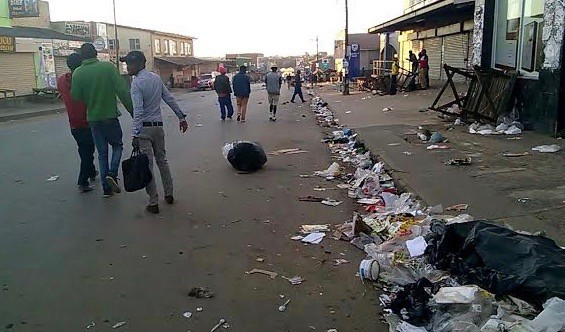Lusikisiki drowning in rubbish and sewage
“I’ve got used to the smell of sewage but my customers have not,” says food stall owner
Small business owners and taxi operators in Lusikisiki are fed-up with the “filthy” state of the small Eastern Cape town, where rubbish accumulates in the streets of the town centre and sewage spills out of a broken storm water drain.
Business owners complain that the raw sewage and uncollected rubbish, which lies on the street for days at time, have affected their businesses. They say the drain has been broken since December last year, causing a great stench in the central business district.
Nomhle Mxino owns a food stall opposite the drain. She says customers have deserted her stall because of the unhygienic environment and the smell.
“Over the past few months, I have actually got used to the smell of sewage and the sight of faeces in the water. My customers, on the other hand, have not. Our businesses are dying. When this business suffers my children will starve,” she said.
Lusikisiki Hawkers’ Association secretary Nomvo Ntsunguzi says many complaints to the municipality about this issue have not led to any action. “Whenever we complain they promise to fix things just to shut us up. Nothing is ever fixed. We are tired of the empty promises. We contribute to the economy of this town, we must be heard,” said Ntsunguzi.
Border Alliance Taxi Association rank manager Thembela Dumisa said taxi owners, like the hawkers, did not feel “respected” by the municipality.
“When you swerve away from a pothole you either drive through rubbish or dirty sewer water. This is not healthy for us or our passengers, considering the amount of time we spend parked next to rubbish. Also, we eat at these stalls,” said Dumisa.
Ingquza Hill Local Municipality began repairing the broken sewer line two days after GroundUp requested a comment on the matter. The municipality’s spokesperson Zamuxolo Matwasa said they were “very apologetic”.
But, he said, the public should also take some responsibility for the dirty state of affairs.
“We put up steel bins on the streets and have encountered vandalism. Some bins were removed and stolen, and some broken. We also have a challenge with hawkers who operate on the pavements and exacerbate congestion in the town. We need public participation to enforce by-laws and make Lusikisiki better, safer and cleaner,” said Matwasa.
Businessman Abdul Vanny owns a barbershop and a laundry business. “The litter that is on the streets, at our storefronts, undermines our efforts to make our places of business presentable. Things have been this way since I arrived here in Lusikisiki in 2014,” he said.
The manager of a local clothing store, Aphiwe Khala, believes that the problem lies with the way the town was planned. “As a shopkeeper I’m not satisfied with the rubbish collection and the cleaning of the streets. But I do understand why the municipality is struggling. The way Lusikisiki is set up makes it difficult to keep clean. There is no space for dustbins because of how congested it is,” said Khala.
Supermarket manager Lukman Patel said locals should help the municipality keep the town centre clean. “People must show more care for their town. We can’t blame everything on the municipality. Every morning I see municipal workers cleaning but by nine o’clock the town is dirty.”
Support independent journalism
Donate using Payfast

Don't miss out on the latest news
We respect your privacy, and promise we won't spam you.
Next: Former PE municipal workers demand jobs
Previous: Police are aggravating the trauma of victims of crime, Ombudsman told
Letters
Dear Editor
Ingquza Municipality must take responsibility and accept that it is failing dismally. There are no spots to place rubbish bins there. Potholes are expanding to tub-sizes. In December 2019, I witnessed with great dismay the Municipality Securities filling a trench with soil by the circle.
Can a municipality that really cares for its people do that? That town is turning into some dump site. Driving through it is also risky because of potholes and rubbish.
© 2020 GroundUp.
This article is licensed under a Creative Commons Attribution-NoDerivatives 4.0 International License.
You may republish this article, so long as you credit the authors and GroundUp, and do not change the text. Please include a link back to the original article.

